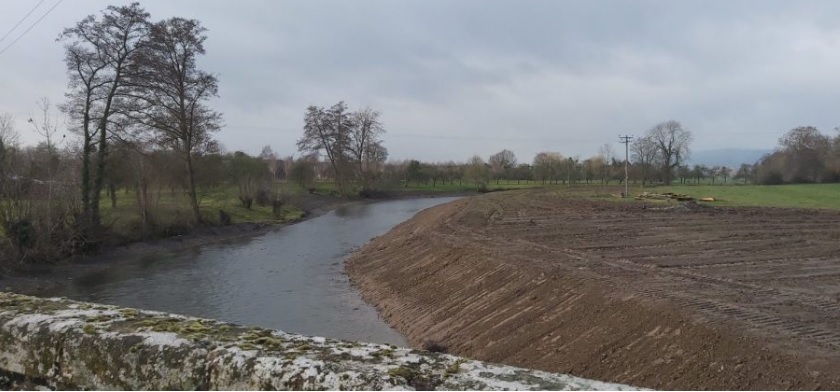Secretary of State for Environment, Food and Rural Affairs, Thérèse Coffey, has said that she is pleased that a criminal sentence has been imposed after horrific pollution and damage was caused to the River Lugg.
Her comments are the opposite of her Conservative colleague, Sir Bill Wiggin, who said that a prison sentence was a waste of taxpayers money.
Sir Bill Wiggin issued a strong statement in response to the news that local farmer John Price has been sentenced following damage caused to the River Lugg in North Herefordshire.
“I support tougher sentencing especially where it is used to protect the public from dangerous people such as burglars, rapists and murderers.
“However a man who has been convicted of damaging a riverbed is not the same sort of threat to our society.
“So I don’t believe that the taxpayer is being well served by giving him a custodial sentence.
“While I respect the division between Parliament and the judiciary, I am very disappointed that the Judge chose to make an example of him and sentence him to 12 months in prison when a fine would have served as a deterrent for potential future offenders.”
Herefordshire farmer John Price was sentenced by District Judge Ian Strongman to 12 months in prison at Kidderminster Magistrates Court yesterday.
MP for North Herefordshire, Sir Bill Wiggin, expressed his disappointment at the custodial sentence imposed on John Price who had prevented the flooding of nearby homes by dredging part of the River Lugg.
Judge Strongman deemed the damage that Mr Price had caused to the riverbed to be worth a 12-month custodial sentence, in addition to the payment of £600,000 for prosecution costs and disqualification from being a director of a limited company for three years.
Original Press Release from the Environment Agency and Natural England:
Natural England and the Environment Agency have today welcomed the seriousness with which the Court has treated the severe and lasting damage to the River Lugg, which destroyed habitats and wildlife on a stretch of one of the country’s most unspoiled rivers.
John Price appeared today at Kidderminster Magistrates Court where he was sentenced to 12 months in prison. He was also ordered to pay prosecution costs of £600,000 and disqualified from being a director of a limited company for three years. In addition, a Restoration Order under the Wildlife and Countryside Act 1981 was imposed requiring Mr Price to carry out a number of actions to restore the river.
The sentence is the result of legal action launched last year by Natural England and the Environment Agency following a joint in-depth investigation into environmental harm caused by the work in 2020 and 2021.
Mr Price used heavy machinery including bulldozers and excavators to dredge and reprofile a 1.5km stretch of the River Lugg at Kingsland, Herefordshire, destroying the riverbed and banks.
The unconsented works were in breach of several regulations, including the Reduction and Prevention of Agricultural Diffuse Pollution (England) Regulations 2018, also known as the Farming Rules for Water; and operations prohibited in the notification of a Site of Special Scientific Interest (SSSI), which persisted despite Mr Price being issued with a Stop Notice.
Due to the exceptionally high diversity of wildlife, the River Lugg is a designated SSSI, with 121 river plant species that live in the river and provide habitat for invertebrates, fish and birds.
The damage to the river and banks removed the habitats of hundreds of these species including otters, kingfishers and salmon as well as destroying trees, aquatic plant life and invertebrates. It is predicted to take decades to re-establish mature trees to provide the stability, cover and shade to restore the diversity of the river.
Fish, plants, native crayfish and birds may take years to make a gradual return to previous populations.
In sentencing Mr Price, the Judge noted that neither the Environment Agency nor Natural England did anything to encourage these works.
Speaking after the verdict, Emma Johnson, Area Manager for Natural England said:
“The destruction of this section of the River Lugg was devastating for the abundance and range of species which thrived in this river.
“The River Lugg is one of the most iconic rivers in the UK and to see this wanton destruction take place was devastating.
“This is why we have used our powers as regulators to see that justice was done and to act as a stark warning to others that we will take the strongest action against those who do not respect the laws that protect the environment and wildlife we all cherish.
“We want to ensure that Mr Price now takes the necessary actions which we hope, in time will restore this much-loved stretch of river to its former condition.”
Martin Quine, Environment Agency Place Manager for Herefordshire added:
“We welcome the outcome of this prosecution for the unconsented works on the River Lugg.
“The Environment Agency is working hard to restore the health of our rivers. It is a complex task that can only be achieved in partnership with landowners. We provide advice and guidance but will impose sanctions or prosecute where appropriate to protect the environment and ensure those who breach regulations are held to account.
“The vast majority of landowners and users fully cooperate with this process.
“While Mr Price’s justification for the works was to help prevent flooding to local properties, his actions did not have any flood prevention benefit. The destruction of river banks is not appropriate flood management. It is important that the Judge recognised that the works significantly weakened flood prevention measures rather than improved them.
“We urge landowners never to take extreme measure such as this and instead to always work closely with the Environment Agency around river management to agree the best solutions for both landowners and the environment.”
As a designated Site of Special Scientific Interest (SSSI), the Lugg is afforded the highest level of environmental protection.
Works to SSSIs or any watercourses must be done in such a way that protects the environment and does not cause any impact on flooding.
Such works can only be undertaken after securing permits from the Environment Agency.




